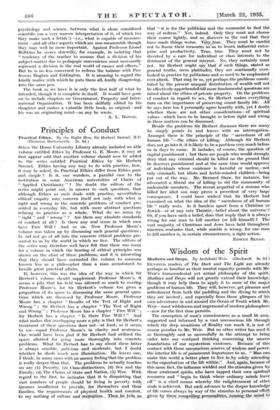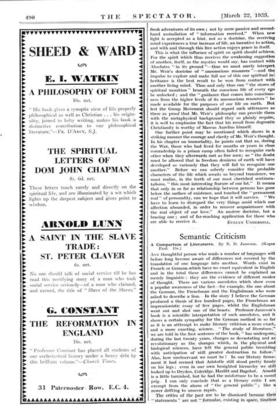Wisdom of the Spirit
Shallows and Deeps. By Archibald Weir. (Blackwell. 8s. 6d.) DEVOTED readers of The Dark and The Light are already perhaps as familiar as their Mental capacity permits with Mr.' Weir's transcendental yet actual philosophy of the spirit.: Shallows and Deeps will not greatly extend their knowledge; though it may help them to apply it to some of the major problems of human life. They will, however, get pleasure and refreshment froin both the paddling and the diving to which they are invited ; and especially from those glimpses of his. own adventurei in and around the Ocean Of Truth which Mr.
Weir—most withdrawn and impersonal of modern philosophers •
—now for the first time permits.
fresh adventures of its own ; not by mere passive and second- hand assimilation of " information received." When new
light is accepted as a hint, not as a doctrine, the receiving mind experiences a true increase of life, an incentive to action, and with and through this free action enjoys peace in itself.
This is what the influence of spirit on spirit should achieve. For the spirit which thus receives the awakening suggestion
of another, itself, as the mystics would say, has contact with Absolutes " in its ground "—thus we must surely interpret Mr. Weir's doctrine of " unconscious resources "—and the impulse to explore and make full use of this our spiritual in.' heritance is the best result to be won from contact with another living mind. -Thus and only thus can the stores of spiritual monition " beneath the conscious life of every ego be unlocked ; and the " guidance that comes into conscious- ness from the higher levels of its unconscious resources " be made available for the purposes of our life on earth. But lest the Group Moirement should regard such utferances as these as proof that Mr. Weir's philosophy can provide them with the metaphysical background they so plainly require, it is well to emphasize the fact that his recoil from dogmatic Christianity is worthy of Marcus Aurelius himself.
One further point may be mentioned which shows in a striking manner the courage and clarity of Mr. Weir's thought. In his chapter on immortality, he points out that as, during the War, those who had lived for months or years in close comradeship in a prison camp often failed to recognize each other when they afterwards met as free men; so "the doubt must be allowed that in freedom denizens of earth will have developed so variously that they will fail to recognize one another." Before we can soberly consider the probable characters of the life which awaits us beyond transience, we must realize, in the teeth of our most cherished sentimen- talisms, " this most interesting feature of our lot." It means that only in so far as relationship between persons has gone below the surface, of existence, and touched the " permanent real " of personality, can we hope that it will survive. " We have to learn to disregard the very things amid which our affection abounded, in order to recover acquaintance with the real object of our love." An austere doctrine, but a bracing one ; and of far-reaching application for those who





























































 Previous page
Previous page